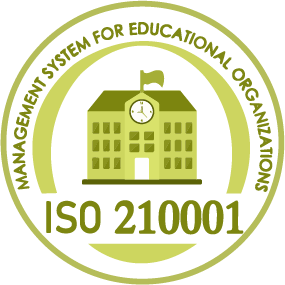Call Us: +201000223355
ISO 21001:2018
ISO 21001:2018 specifies the requirements for a management system for educational organizations (EOMS). It applies to any organization that provides, shares, and facilitates the development of knowledge through teaching, learning, or research, regardless of the type, size, or method of delivery. The standard focuses on the interaction between the educational institution, learners, customers, and other relevant interested parties.

What is ISO 21001:2018?
ISO 21001:2018 specifies the requirements for a management system for educational organizations (EOMS). It applies to any organization that provides, shares, and facilitates the development of knowledge through teaching, learning, or research, regardless of the type, size, or method of delivery. The standard focuses on the interaction between the educational institution, learners, customers, and other relevant interested parties.
Key Features of ISO 21001:2018:
-
Risk Assessment and Treatment: The standard emphasizes conducting a thorough risk assessment to identify information security risks and implement appropriate measures to mitigate them.
-
Leadership and Commitment: Top management must demonstrate leadership and commitment to the ISMS, ensuring it is integrated into the organization’s processes and strategic direction.
-
Information Security Policy: Organizations must establish an information security policy that aligns with their objectives and demonstrates their commitment to protecting information assets.
-
Asset Management: Identifying and managing information assets is crucial, including determining their value, and ensuring appropriate protection measures are in place.
-
Access Control: Implementing controls to manage access to information and systems, ensuring only authorized personnel can access sensitive information.
-
Incident Management: Establishing processes for detecting, reporting, and responding to information security incidents to minimize their impact.
-
Compliance: Ensuring compliance with legal, regulatory, and contractual requirements related to information security.
-
Awareness and Training: Providing regular training and awareness programs to ensure employees understand their roles and responsibilities in maintaining information security.
-
Continual Improvement: Monitoring and reviewing the ISMS regularly to identify areas for improvement and ensure its effectiveness.
Benefits of ISO 21001:2018 Certification:
-
- Enhanced Information Security: A robust ISMS helps protect sensitive information from security breaches, ensuring its confidentiality, integrity, and availability.
- Regulatory Compliance: Assists organizations in meeting legal and regulatory requirements related to information security, reducing the risk of non-compliance.
- Risk Management: Identifying and addressing information security risks proactively helps prevent incidents and protect the organization’s reputation.
- Customer Trust: Certification demonstrates a commitment to information security, enhancing trust and confidence among customers, partners, and stakeholders.
- Operational Efficiency: Streamlined processes and effective risk management lead to increased operational efficiency and reduced costs.
- Business Continuity: Ensuring the security of information assets contributes to overall business continuity and resilience.
- Global Recognition: ISO/IEC 27001:2013 is recognized worldwide, facilitating international business and trade by ensuring a consistent approach to information security management.
Conclusion:
ISO 27001:2013 is a critical standard for organizations committed to safeguarding their information assets. By implementing an effective ISMS, organizations can enhance their information security, ensure regulatory compliance, and build trust with stakeholders. Achieving ISO/IEC 27001:2013 certification demonstrates a commitment to protecting sensitive information, fostering confidence and credibility in the marketplace. Adopting ISO/IEC 27001:2013 is a strategic decision that supports long-term success and resilience in today’s digital landscape.